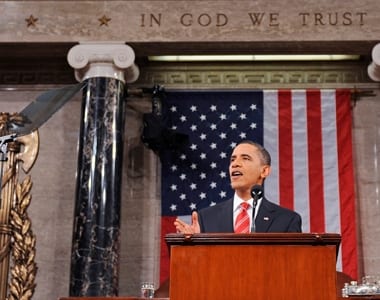In his first State of the Union address President Obama said he would not back down as he fights to reinvigorate his sweeping domestic political agenda, and focused in particular on tackling unemployment.
Coming off a tumultuous few months, he also delivered a candid assessment of his own performance after a rocky first year in office, which ended with last week’s surprise loss of a key Democratic Senate seat in Massachusetts.
His first-year struggles were highlighted by a long, messy health care debate, the weak economy, and the mistakes that led to the botched Christmas Day terrorist attack.
But after acknowledging his errors, he vowed to fight on.
“I will not give up on trying to change the tone of our politics,” he said.
“We don’t quit. I don’t quit. Let’s seize this moment to start anew, to carry the dream forward and to strengthen our union once more.”
NOT A ‘GAME CHANGER’
Professor of history and public affairs at Princeton University, Julian Zelizer, said voters would appreciate the President being frank about his political setbacks.
“I do think people like that aspect of him. He’s very direct, he’s honest about the problems he faces and about what he wants to do and his aspirations,” he said.
Professor Zelizer said Mr Obama’s speech was “solid” but not remarkable.
“It wasn’t a stunning speech,” he said.
“It went on too long and there were so many things in it. I think people will pick and choose one or two items but I don’t think it’ll have a long-term effect.
And Professor Zelizer does not believe the speech will allow the President to take back control of the political agenda.
“One of the remarkable things historically is these [State of the Union speeches] have very little effect – at most a few days,” he said.
“There are very few speeches that have really been “game changers” as they say, most are unremarkable and most don’t have a big effect.
“So, my guess is this will not change the dynamics in Washington. I suspect a week from now we’ll be where we were yesterday and two days ago.”
SIGNIFICANT BOUNCE
But resident scholar at the American Enterprise Institute, Norm Ornstein, predicted Mr Obama would get a “significant bounce” from the speech.
“It’s not as if 200 million people watch the State of the Union or watch all of it, but you’ve got a sizeable core of people who do and who will and it was an inspirational speech in a lot of ways and a sobering speech in others,” he said.
“But it was extraordinarily coherent and well delivered, and my guess is that just as we’ve seen with some previous State of the Union messages – Ronald Reagan shortly after he had been shot, Bill Clinton when he was on the ropes – this is going to give him a little bit of a springboard after a pretty rough couple of months.”
Professor Geoffrey Garrett, head of the US Studies centre at the University of Sydney, said it was unclear what the effect of the speech would be.
“There is a lot of pomp and circumstance surrounding speeches like this. Who knows whether the speech itself will give Obama a blip or not,” he said.
“But I think the more important thing about the speech today is it really is a blueprint for the Obama strategy for 2010, which in turn is a reaction to the verdict on Obama 2009.
“The negative verdict that came out in what everyone’s now calling the Massachusetts Massacre – the loss of the Kennedy seat by the Democrat party, which was a referendum against the Obama administration, it’s fair to say.”
Job focus
Mr Obama used the address to try to seize the reins and push job creation to the top of his political agenda.
“Jobs must be our number one focus in 2010, and that’s why I’m calling for a new jobs bill tonight,” he said to rapturous applause.
Even with 10 per cent unemployment and a trillion dollar deficit, Mr Obama said the worst of the economic storm had passed, although the devastation remained.
He promised to redirect $30 billion from a Wall Street bailout fund to help small business and proposed a new small business tax credit.
Professor Garrett said the speech showed the President had realised that most Americans were more concerned with their livelihoods than anything else.
“He’s heard from Main Street: ‘you spent a year bailing out Wall Street, obsessed with health care, and we care about the fact that unemployment is 10 per cent and a quarter of Americans owe more on their homes than their homes are worth’,” he said.
“That was the message that Obama wanted to signal that he heard loud and clear and that he’s going to do something about, and that’s what I think his speech was all about today.”
Dr Ornstein agreed the speech was partly aimed at quelling public fears about high unemployment.
“One of the main things that he was hoping to do was to make a pivot to turn the focus to jobs, and that’s what most Americans are concerned about now,” he said.
“And this at least lets him recapture that agenda.”
2009 Australian Broadcasting Corporation. All Rights Reserved.







